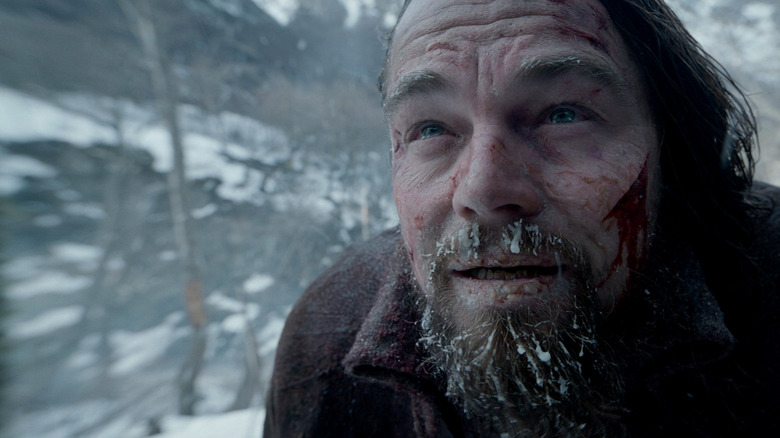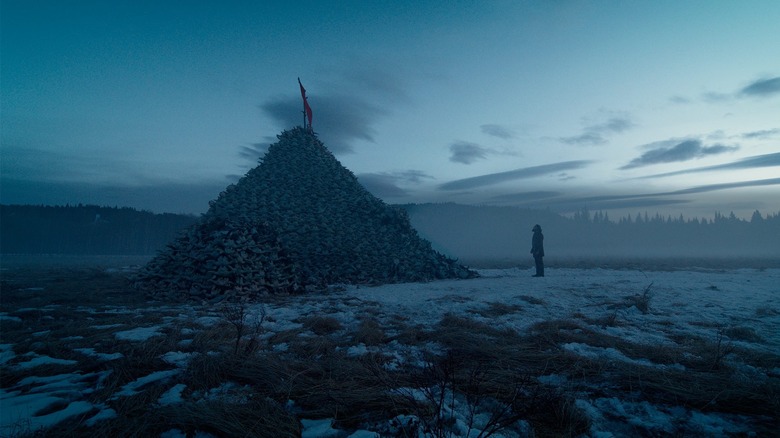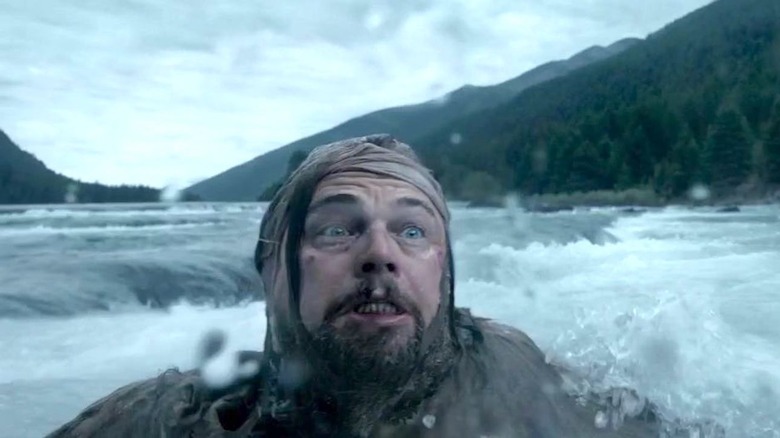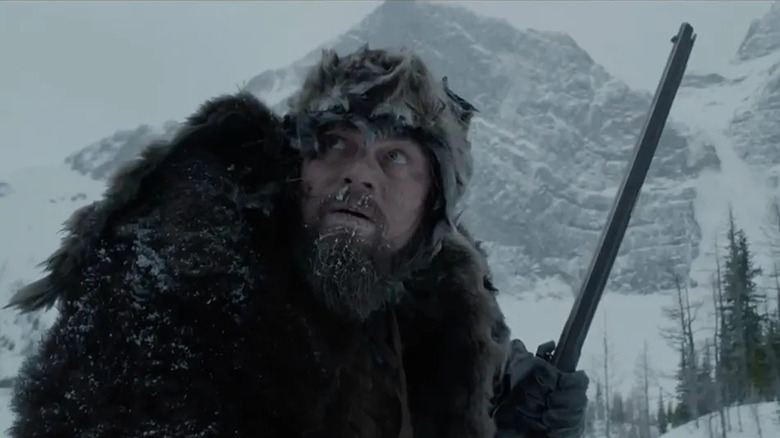Director Alejandro G. Inarritu Pushed The Revenant's Crew A Little Too Far
To make an omelet, one needs to break some eggs. Making a film is only slightly different in that instead of a few fragile shells, you need an entire film crew. For Alejandro G. Iñárritu, the idiom's core idea held true working on "The Revenant." But in the eyes of the daring director, a lot needed to be sacrificed and endured if they were going to make a film about the excruciating journey of Hugh Glass. There was the unpaved mountain road braved to reach the set, the brutal cold, and the decision to film in chronological order and absolutely only in natural light, a resource rarer than heat and that only appeared once a day. To these constraints, Iñárritu and cinematographer Emmanuel "Chivo" Lubezki were zealously dedicated.
One imagines the tension director, actors, and crew felt being given such an atom-sized needle hole to thread a day's worth of shooting into. The difficulty of facing temperatures most of us will never even remotely experience and all the while trying to record dialogue, move fingers, operate a camera. One imagines but one fails — so it's probably best to take it straight from the frozen lips of the people who lived it.
First snowfall shakes production to its core
The crew divulged details about the crucible of filming "The Revenant" in a Men's Journal story published just days before the premiere. Interviews paint a grim picture that loosely mirrors the experiences of the film's very characters, minus a certain gruesome bear attack and any other moments of violence. Production designer Jack Fist revealed it was clear from the beginning that Iñárritu was going to lead them on a turbulent quest:
"From the beginning Alejandro wanted the locations to be kind of wild and scary. At one of the production meetings he said, 'It's the story of spiritual enlightenment through spiritual suffering,' so I knew we were in trouble."
There probably should've been an imaginary asterisk after the statement noting it wouldn't just be the characters suffering. And by no means would the suffering be solely spiritual — not if winter had anything to say about it. When it finally started to snow, the crew quickly realized exactly what kind of tribulation they'd signed up for. Fisk described shooting an important scene wherein actors had to cross a river when it was 30 degrees below zero outside:
"Everybody was freezing. Parts of the river were freezing over as we were shooting, and suddenly big chunks of ice were coming up over the set."
It was the onset of a truly bitter winter that marked the start of problems for "The Revenant" and its director. Although, truth be told, Iñárritu seemed emboldened by any new challenge that presented itself, especially those that were part of his hunt for complete immersion.
DiCaprio draws the line
If there was one actor put through the ringer more than most, it was Leonardo DiCaprio, who became a reincarnation of Glass via transcendent discomfort. He was even given a kind of baptism in the frozen river — something the bearskin coat DiCaprio was wearing immediately took issue with. DiCaprio told Men's Journal:
"It absorbed about 50 pounds of water, and then it immediately froze. Every day was a battle for myself and a lot of other people not to get hypothermia."
It's hard to wrap your head around the kind of motivational speech one gives themselves to get through a day of shooting that involves repeatedly swimming neck-deep in subzero water. If anything, now we know exactly how much an Oscar is worth when converted into the currency of an actor's suffering. Obviously, DiCaprio in no way knew or believed agony would reserve him a little golden man, as evidenced by the moment he drew the line on Alejandro Iñárritu's daredevilry:
"We were supposed to do a scene with my son as he's praying for me. And it hit 40 below zero. At that point we couldn't really open our eyes. And our fingers locked together and the camera gear locked together, and I just looked at Alejandro and said, 'I'm all for enduring realism, but there comes a point when nothing is operable.' "
DiCaprio had endured plenty already, including a savory bite into real buffalo liver, so his words didn't sit lightly. You might need to crack eggs to make an omelet, but no one — not even Iñárritu — could make an omelet with frozen eggs. On November 29, the production for "The Revenant" halted for almost two months and its director was forced to concede to higher powers (i.e. the weather).
Iñárritu's quixotic boldness
Before it got to that point, however, Alejandro G. Iñárritu had no qualms about being the one to push the film's crew to their absolute limits. Iñárritu staunchly defended his rigid filming tactics, revealing a distaste for cushiony filming conditions while also admitting he needed to be reined in. He told Men's Journal:
"The producers wanted to evacuate us, the actors couldn't move their lips, and I was pretending everything was all right. ... When you think about it, we have become such pussies. We are complaining because we don't have Wi-Fi in a plane 10,000 feet from the ground. Or the coffee is cold. These guys, they found a way of living with tough conditions. Hugh Glass, surviving 200 miles after a bear attack — people can feel it's a fantasy, but it's a real thing."
It wouldn't be the last time Iñárritu would have to relent. Many of the last scenes in the film were shot in Argentina. (Iñárritu kept his promise in filming chronologically.)
The forced location switch was owed to a curious absence in the film crew's previously unrelenting muse: snow. "The natives were stunned," Iñárritu continued. "It was one of the hottest winters registered in Canada's history." There's something deliberately on the nose about an uncharacteristically hot winter affecting production on a film with such visceral environmental overtones.
But in the end, Iñárritu and company were forced to endure and adapt. "The Revenant" did not end up being the "beautifully shot mess" that Men's Journal mused it might be. And if Iñárritu's films continue to have even only a fraction of the beauty as "The Revenant" — and, perhaps just as critically, continue to win DiCaprio Oscars — it makes it proportionately easier to accept the mess that goes into making them.



